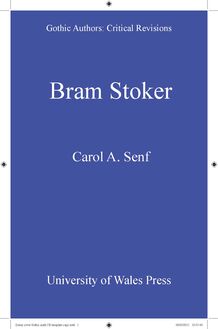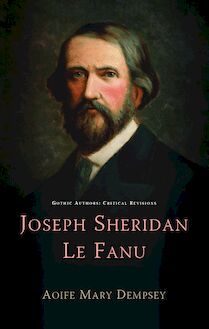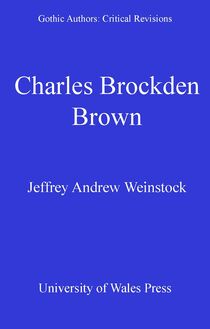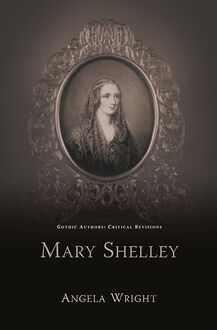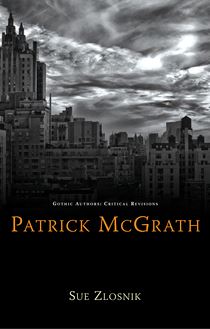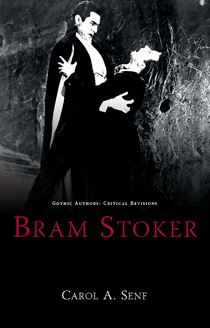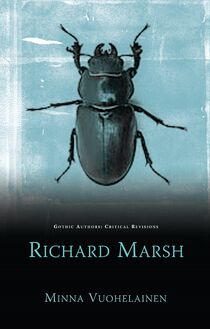Ramsey Campbell , livre ebook
135
pages
English
Ebooks
2023
Vous pourrez modifier la taille du texte de cet ouvrage
Obtenez un accès à la bibliothèque pour le consulter en ligne En savoir plus
Découvre YouScribe en t'inscrivant gratuitement
Découvre YouScribe en t'inscrivant gratuitement
135
pages
English
Ebooks
2023
Vous pourrez modifier la taille du texte de cet ouvrage
Obtenez un accès à la bibliothèque pour le consulter en ligne En savoir plus
Publié par
Date de parution
15 mai 2023
Nombre de lectures
0
EAN13
9781786839879
Langue
English
Acknowledgements
Introduction: A Neglected ‘Poet’: Campbell and Gothic Tradition
1. Impractical Magic: Campbell’s Agnostic Gothic
2. Of Bonds and Beings: Campbell’s Gothic Sociopaths
3. Writing with Intensity: Campbell’s Gothic Novellas
4. ‘Ghosts’ from the Machine: Campbell’s Gothic Techno-Fictions
Conclusion: ‘Something to Believe in’: Repositioning Campbell in the Gothic – and Beyond
Notes
Bibliography
Index
Publié par
Date de parution
15 mai 2023
Nombre de lectures
0
EAN13
9781786839879
Langue
English
RAMSEY CAMPBELL
SERIES PREFACE
Gothic Authors: Critical Revisions is dedicated to publishing innovative introductory guides to writers of the Gothic. The series explores how new critical approaches and perspectives can help us to recontextualize an author’s work in a way that is both accessible and informative. The series publishes work that is of interest to students of all levels and teachers of the literary Gothic and cultural history.
SERIES EDITORS
Andrew Smith, University of Sheffield
Benjamin Fisher, University of Mississippi
EDITORIAL BOARD
Kent Ljungquist, Worcester Polytechnic Institute, Massachusetts
Richard Fusco, St Joseph’s University, Philadelphia
David Punter, University of Bristol
Angela Wright, University of Sheffield
Jerrold E. Hogle, University of Arizona
GOTHIC AUTHORS: CRITICAL REVISIONS
Ramsey Campbell
Keith M. C. O’Sullivan
© Keith M. C. O’Sullivan, 2023
All rights reserved. No part of this book may be reproduced in any material form (including photocopying or storing it in any medium by electronic means and whether or not transiently or incidentally to some other use of this publication) without the written permission of the copyright owner. Applications for the copyright owner’s written permission to reproduce any part of this publication should be addressed to the University of Wales Press, University Registry, King Edward VII Avenue, Cardiff CF10 3NS.
www.uwp.co.uk
British Library CIP Data
A catalogue record for this book is available from the British Library
ISBN 978-1-78683-985-5
eISBN 978-1-78683-987-9
The right of Keith M. C. O’Sullivan to be identified as author of this work has been asserted in accordance with sections 77 and 79 of the Copyright, Designs and Patents Act 1988.
The publisher has no responsibility for the persistence or accuracy of URLs for any external or third-party internet websites referred to in this book, and does not guarantee that any content on such websites is, or will remain, accurate or appropriate.
Cover image : warehouse interior at Stanley Dock, Liverpool © Ian Hubball / Alamy Stock Photo.
To Denise, who gave this Wanderer a home, and in loving memory of my father, Robert Michael O’Sullivan
C ONTENTS
Acknowledgements
Introduction: A Neglected ‘Poet’: Campbell and Gothic Tradition
1 Impractical Magic: Campbell’s Agnostic Gothic
2 Of Bonds and Beings: Campbell’s Gothic Sociopaths
3 Writing with Intensity: Campbell’s Gothic Novellas
4 ‘Ghosts’ from the Machine: Campbell’s Gothic Techno-Fictions
Conclusion: ‘Something to Believe in’: Repositioning Campbell in the Gothic – and Beyond
Notes
Select Bibliography
Acknowledgements
My thanks go to Ramsey Campbell himself, who in correspondence has been as amenable, approachable and friendly as all sources attest.
My deepest gratitude to the following members or former members of the English department at Manchester Metropolitan University: Xavier Aldana Reyes, Sorcha Ní Fhlainn, Linnie Blake, Dale Townshend, Paul Wake, David Wilkinson, Rachel Lichtenstein and Rachid M’Rabty. Above all to Xavi, for his diligent and thorough reading of the various drafts of chapters during my initial doctoral project, and for his tactful suggestions which helped it take shape. Matt Foley at Manchester Metropolitan and Kevin Corstorphine at the University of Hull, my examiners, are also owed a huge debt for their careful scrutiny and constructive input.
My thanks and appreciation go to Neil Curtis, Head of Museums and Special Collections, and to other colleagues at the University of Aberdeen, particularly Jane Pirie, Michelle Gait and Dan Wall, for their encouragement and support.
Staff at the University of Liverpool’s Special Collections department, especially Robyn Orr, were most helpful in answering queries about the Ramsey Campbell archive.
Finally, thanks to my family: my mother Helena and my brother Stuart, but especially to my wife, Denise, for her support and boundless patience living with the variety of monsters in my head over the last four years.
Introduction: A Neglected ‘Poet’: Campbell and Gothic Tradition
‘I write horror’, Ramsey Campbell declares boldly on his own website. 1 Although Campbell himself is clearly content with such a label, he and his work present a number of challenges and contradictions, both within and beyond the Gothic. From one perspective, Campbell is difficult to ignore. Born in Merseyside in 1946, he has been described as ‘Britain’s most respected living writer’ of horror fiction by the Oxford Companion to English Literature . 2 Campbell was a precocious author: what was to become his first published tale, ‘The Church in High Street’, was accepted by August Derleth at Arkham House in 1962, and his first collection of short stories, originally entitled The Inhabitant of the Lake and Less Welcome Tenants (1964) by ‘J. Ramsey Campbell’, followed from the same publisher, when the author was just eighteen. 3 In an ensuing career now spanning over half a century, Campbell has also been extremely prolific. His output to date has included around three hundred short stories, the form for which he remains best known, and, beginning with The Doll Who Ate His Mother (1976), over forty original novels and novellas. 4 Campbell was recognised at an early stage by Stephen King, his almost exact contemporary, for both a ‘lucid’ prose style and a keenly delineated ‘sense of place’. 5 In addition, Campbell has been an active professional commentator and a meticulous scholar in his own right. He served as a film and later DVD critic for BBC Merseyside radio for nearly forty years, from 1969 until 2007, and has been an assiduous editor and anthologist. In the latter capacity, he has promoted the work of both established authors such as M. R. James, and emergent or forgotten ones like Thomas Ligotti or Adrian Ross, whose 1914 novel, The Hole of the Pit , was reprinted for the first time in Campbell’s anthology Uncanny Banquet (1992). 6 A frequent and candid interviewee, Campbell has also produced a trove of other paratextual material in the form of stand-alone reflective essays, introductions and afterwords. Finally, Campbell has been the recipient of numerous honours, from the British Fantasy Society, the Horror Writers’ Association and the International Horror Guild amongst others. Recognition seemed to reach a new zenith when, in 2015, Campbell was awarded both the World Fantasy Award for Lifetime Achievement and an Honorary Fellowship from Liverpool John Moores University for an outstanding contribution to literature.
However, despite this level of productivity and acclaim, one is struck by the contrasting reception accorded to Campbell compared with King, unquestionably the world’s most famous contemporary writer of Gothic horror, or indeed with Clive Barker, Campbell’s fellow Liverpudlian. The discrepancy is glaring in two respects. One is obviously commercial: Campbell’s name recognition outside the field of horror fiction and sales are simply not on the same scale as King’s, while Barker, since a spectacular debut with the Books of Blood collections (1984–5), has both relocated successfully to the United States and diversified widely into other forms of media and genre. 7 In stark contrast, despite being a full-time professional writer with more than thirty published books and over a dozen awards to his credit, Campbell could still be found working in a bookstore as late as 2003. In terms of prominence in popular culture, adaptations of Campbell’s work to other media have not been undertaken on anything comparable to the industrial scale that King’s have been, and there is no equivalent to the Hellraiser or Candyman franchises in his oeuvre. 8 ‘John Horridge’, the antagonist in Campbell’s novel The Face That Must Die (first published in 1979, revised in 1983) has enjoyed nothing like the iconic status of Thomas Harris’s ‘Hannibal Lecter’. This is despite Campbell’s novel having anticipated the enduring proliferation and popularity of serial killer-related literature since the late 1980s by almost a decade. His embrace of being a ‘horror’ writer notwithstanding, a certain protean nonconformity has contributed to this curious and paradoxical lack of recognition. Campbell’s output, as well as being substantial, has varied widely in subject matter. As exemplied in the shift within one year from a social realist suspense thriller, The One Safe Place (1995), to a haunted-house narrative, The House on Nazareth Hill (1996), the writer has alternated between supernatural and non-supernatural content. He has also frequently revisited themes and even characters. While comparable range (and often great individual length), have not impeded King either commercially or, latterly, critically, Campbell’s apparent heterogeneity and hence resistance to categorisation partly accounts for this British author so far experiencing the same combination of an artist’s respect but minority, niche appeal that H. P. Lovecraft, Campbell’s early and enduring influence, experienced during his lifetime.
The second disparity relates to academic scholarship. Both King and Barker have now received substantial attention from critics. 9 In contrast, any major project on Campbell can make claim to what has been comparatively neglected territory. His fictions have been simultaneously both lauded and, at least thus far, comparatively overlooked and marginalised. In brief, to date, the academy has not known quite where to place Campbell. This is not to deny that, as with Lovecraft before him, there has been much laudatory and critical attention given to the author, both in print and online, from amateur enthusiasts and critics in the form of book reviews and web blogs. 10 As well as having his own website, Campbell himself is a regular on the conference circuit and, with S. T. Joshi and Stefan Dziemianowicz, even produced a bibliography and reader’s guide to his own collected works as early
